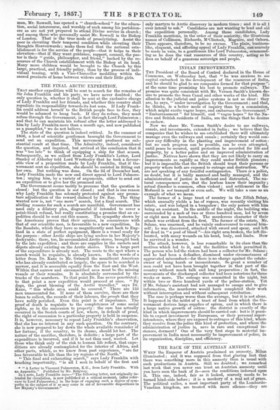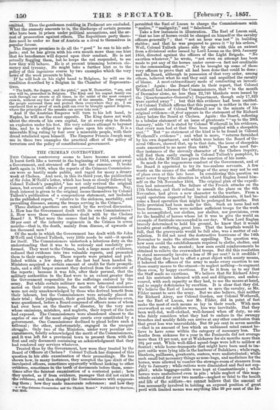THE BACK OF THE AUSTRIAN AMNESTY.
WILEN the Emperor of Austria proclaimed an amnesty, Milou illuminated ; and it was supposed from that glaring fact that there was something more in this amnesty than is usual with such productions in Austria. Still we doubted; we remarked last week that you never can trust an Austrian amnesty until you have seen the back of it—seen the conditions indorsed upon. it. This one, indeed, fair as it looked, scarcely needs to be turned hind-side before; it is a mockery of a real act of grace. The political exiles, a most important party of the LombardoVenetian kingdom, are treated with mere silence—they are
omitted. Thus the gentlemen residing in Piedmont are excluded. What the amnesty amounts to is, the discharge of certain persons who have been in prison under political accusations, and the arrest of prosecution against others. The Republican party therefore need be under no fear of Austria as a rival to themselves in popular favour.
The Emperor promises to do all the " good " he can to his subjects; and he has given with his own mouth more than one hint that his beneficence will depend upon their conduct. He is not actually flogging them, but he keeps the rod suspended, to see how they will behave. He is at present trimming between clemency and tyranny. He might take a farther hint as to the policy of this ingenious course by two examples which the very news of the week presents to him. If he will look on his right hand to Belgium, he will see its condition described by a Belgian in the Chamber of Representatives.
"The knife, the dagger, and the pistol," says M. Dumortier, "are, and ever will be, proscribed in Belgium. The Bing and his august family can walk through our streets at all times, in the midst of the most compact crowds, without any fear of the attempts of the assassin. The respect of the people surround them and protect them everywhere they go. I am convinced that no proof of such guilt can ever be brought against Belgium, where the principles of the assassin can never take root." And if the Austrian Emperor will turn to his left hand, to Naples, he will see the exact opposite. The King dares not walk about the streets of his own capital, for at every step he dreads an explosion under his feet. His very, soldiers attempt to bayonet him, and he is obliged to place spies upon his army-. It is a miserable King ruling by fear over a miserable people, with their dread retaliated upon himself. The Emperor Francis Joseph may see in these two examples the practical effect of the policy of terrorism and the policy of constitutional government.



































 Previous page
Previous page